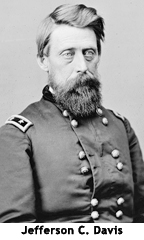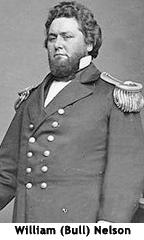|
Murder of William (Bull) Nelson result
of confusion, misunderstanding, mistrust
By BRYAN BUSH
Bugle Staff Writer
(EDITOR’S NOTE: This account of the murder of Union Gen. William (Bull) Nelson is based on meticulous research by Bryan Bush. We believe this to be the most accurate information concerning the incident.)
During the Confederate invasion of Kentucky in 1862, an incident occurred at the Galt House in Louisville that would change the Union command of the Army of the Ohio and leave one Union general dead at the hands of another.
  Gen. Jefferson C. Davis (no relation to the Confederate President Jeff Davis) shot and mortally wounded Gen. William (Bull) Nelson on Sept. 29, setting the stage for a new Federal commander for the Army of Ohio. The incident took place quickly, but it was played out against a background racked with confusion, misunderstanding and mistrust. Gen. Jefferson C. Davis (no relation to the Confederate President Jeff Davis) shot and mortally wounded Gen. William (Bull) Nelson on Sept. 29, setting the stage for a new Federal commander for the Army of Ohio. The incident took place quickly, but it was played out against a background racked with confusion, misunderstanding and mistrust.
It began in August 1862, as Confederate Gen. Braxton Bragg, with the Army of the Mississippi, and Confederate Gen. Edmund Kirby Smith, with the Army of the East Tennessee, invaded Kentucky.
Bragg’s goal was to seize Louisville and the Portland Canal. The invasion of Kentucky went well for the Confederates at first, as they managed to defeat the Union army under Gen. Nelson at the Battle of Richmond. Gen. Smith then took Lexington and Bragg took Frankfort. To most of the officials in Washington, it was thought Louisville would fall to the Confederates.
The War Department ordered Nelson to command the newly formed Army of the Ohio. Nelson sent Union troops to build pontoon bridges at Jeffersonville and New Albany, Ind. in order to speed up the arrival of reinforcements, supplies and, if needed, the evacuation of the city.
Louisville citizens, Union troops, and impressed labor prepared for the Confederate army under Bragg by building a ring of breastworks and entrenchments around the city. During this time, Jefferson C. Davis, who could not reach his command under Gen. Don Carlos Buell, met with Nelson in Louisville to offer his services.
Nelson gave him command of the city militia. Gen. Davis opened an office and went to work in assisting the organization. Davis then informed Nelson that his brigade was ready for service and asked if he could obtain arms for his men. Nelson asked Davis how many men were in his brigade and Davis responded that he had about 2,500 men.
Nelson angrily barked to Davis, “About twenty-five hundred! About twenty-five hundred! By God! You a regular officer and come here to me and report about the number of men in your command? God damn you, don’t you know, sir, you should furnish me the exact number?”
Davis told Nelson that he did not expect to get the guns now and only wanted to learn if and where he could get them. Nelson flew into a rage and screamed at Davis, “About twenty-five hundred! By God I suspend you from your command and order you to report to Gen. (Horatio) Wright; and I’ve a damned mind to put you under arrest. Leave my room, sir!” Davis informed Nelson that he would not leave the room until he gave him an order. Nelson barked, “The hell you won’t! By God I’ll put you under arrest, and send you out of the city under a provost guard! Leave my room, sir!”
Davis left the room, and, in order to avoid arrest, crossed over the river to Jeffersonville, where he remained until the next day, when Gen. Stephen Burbridge joined him. Burbridge had also been relieved of command by Nelson due to a trivial incident. Davis went to Cincinnati with Burbridge and reported to Gen. Wright, commander of the Department of the Ohio, who ordered Davis to return to Louisville and report to Gen. Buell. Burbridge was told to remain in Cincinnati.
On Sept. 29, Nelson ate an early breakfast at the Galt House. After breakfast, he stopped at the hotel desk and inquired whether Gen. Buell, who also had a room on the second floor of the Galt House, had breakfasted yet. The clerk told Nelson that Buell had not eaten.
Nelson turned, leaned his back against the counter, faced the people and glanced over the hall. He noticed Davis and Davis also saw Nelson. Governor of Indiana Oliver Morton was asked to witness a conversation between Davis and Nelson. The Governor agreed and the two walked up to Nelson and Davis confronted Bull and told him that he had taken advantage of his authority.
Nelson, sneeringly and placing a hand to his ear, said, “Speak louder, I don’t hear very well.” Davis in a louder tone repeated his statement. Nelson indignantly told Davis that he did not take advantage of his authority. Davis told Nelson that he had threatened to have him arrested and sent out of the state under provost guard. Nelson struck Davis twice in the face and stated, ”There, damn you, take that!” Davis left the room, but before he left he told Nelson, “This is not the last of it; you will hear from me again.” Turning to Gov. Morton, Nelson asked him if he came to insult him, too. Morton stated that he had not come to insult Nelson, but had been requested to be present and listen to the conversation between Nelson and Davis. Nelson violently told the bystanders, “Did you hear the damned rascal insult me?”
In three minutes, Davis returned with a pistol he had borrowed from a Capt. Gibson. He saw Nelson walk into the hall and the two faced each other ten yards apart. Davis drew his pistol and fired, the ball entering Nelson’s heart. Nelson threw up both hands and grabbed a gentleman who stood nearby and exclaimed, “I am shot!”
Nelson then walked up the stairs toward Buell’s room, but sank at the top of the stairs. Fellow officers took Nelson to his room and laid him on his bed. Nelson requested the Rev. Mr. Talbott to see him at once. Talbott administered the ordinance of baptism and the General whispered, “It’s all over,” and died fifteen minutes later. News spread quickly among the regiments about Nelson’s death and excited crowds gathered around the Galt House. Rumors circulated that Confederate President Jefferson Davis had sneaked into Louisville and shot Nelson. The Union command in Louisville ordered the soldiers back into camp and a heavy provost guard patrolled the streets. Luckily, Nelson’s old command, the 4th Division, was not in the city when the shooting took place, as members of the division were devoted to him and would have demanded vengeance. Some of the divisions considered Nelson a tyrant and threw their hats into the air when they heard of his death. J. F. Culver of the 129th Illinois Infantry wrote, “Gen. Nelson was killed this morning by Gen. Davis. I have heard no one express any regret. He was disliked by the whole army for being tyrannical, drunken, and very unpleasant.”
Strangely, the official notice of his death became a terse report in the Army’s official orders for the day. Afterward, Nelson’s body lay in state in the Galt House and later his body was escorted by 1,200 men to Christ Church Cathedral and buried in Cave Hill Cemetery.
After the murder, Union authorities placed Gen. Davis under house arrest, but on Oct. 13, 1862, Union authorities released him, as the period of his arrest without charge expired. Another reason for Davis’ release may have been the shortage of generals in the field and Buell needed every general to take on Bragg’s army. Davis hired James Speed as his defense attorney. Speed knew President Abraham Lincoln through his brother, Joshua Speed, who was Lincoln’s closest friend. James Speed would later become Lincoln’s attorney general in 1864. Gov. Morton and James Speed managed to delay Davis’s manslaughter indictment for two years and on May 24, 1864, the courts struck the criminal case against Davis from the docket. With Nelson dead, the command of the Army of the Ohio switched to Gen. George Thomas, but Thomas felt he did not have sufficient seniority to command the regiment. So the command fell to Don Carlos Buell.
During the Battle of Perryville, Bragg managed to defeat Buell’s Army of the Ohio tactically and routed an entire corps. Strategically, the Battle of Perryville, which was fought on Oct. 8, 1862, was a victory for the Union army, as Bragg and Smith left the state of Kentucky, never to return.
The War Department investigated Buell’s actions at Perryville and relieved him of command, replacing him with Union Gen. William S. Rosecrans. During the war, Gen. Davis would fight at the Battles of Stone’s River, Chickamauga, and, by 1864, he led Gen. William Sherman’s 14th Corps in Georgia. He received full respect and trust from Sherman.
|

